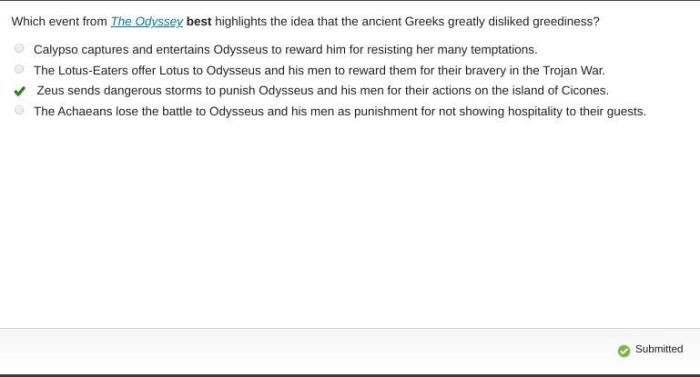Which event from the odyssey best highlights the idea – Which event from the Odyssey best highlights the power of resistance? This question has intrigued readers and scholars alike for centuries, as the epic poem offers a wealth of episodes that test the limits of human endurance and resilience. From the allure of the Sirens’ song to the dangers of Circe’s isle, Odysseus and his crew face countless challenges that require them to resist temptation, overcome adversity, and ultimately find their way home.
Throughout the Odyssey, Odysseus emerges as a figure who embodies the power of resistance. Time and again, he demonstrates his ability to withstand hardship, outwit his enemies, and maintain his resolve in the face of seemingly insurmountable odds. Whether he is resisting the temptation to succumb to the Lotus-Eaters’ idyllic existence or devising a cunning plan to escape from the Cyclops’ cave, Odysseus’s unwavering determination serves as an inspiration to all who face adversity.
Circe’s Isle

Circe, a powerful sorceress, plays a pivotal role in Odysseus’s journey. Upon reaching her island, Odysseus’s men succumb to her enchantments and are transformed into pigs. Odysseus, protected by Hermes, confronts Circe and compels her to restore his crew. The episode highlights the dangers of temptation and the importance of resisting the allure of instant gratification.
Circe’s Transformations and Symbolism
Circe’s ability to transform men into animals symbolizes the power of desire to corrupt and dehumanize. The transformation of Odysseus’s men into pigs represents their loss of reason and their descent into bestiality. Circe’s own transformation into a beautiful woman foreshadows the dangers of female sexuality and the temptation it poses to Odysseus’s resolve.
Foreshadowing Odysseus’s Return
Circe’s prophecy about Odysseus’s future journey foreshadows his eventual return home. She warns him of the dangers that lie ahead, including the Sirens and the Cyclops. Her prophecy serves as a reminder of Odysseus’s ultimate goal and the challenges he must overcome to achieve it.
The Cyclops’ Cave

Odysseus’s encounter with Polyphemus, the Cyclops, tests his cunning and resourcefulness. Trapped in the Cyclops’s cave, Odysseus blinds him and escapes with his crew. The episode highlights the importance of strategic thinking and the ability to adapt to unexpected circumstances.
Odysseus’s Cunning and Resourcefulness
Odysseus’s plan to blind Polyphemus demonstrates his quick wit and ability to outsmart his adversaries. By exploiting the Cyclops’s weakness and using deception, Odysseus is able to escape from a seemingly impossible situation. His cunning and resourcefulness become essential traits for his survival throughout his journey.
Significance of Polyphemus’s Blinding
Polyphemus’s blinding has far-reaching consequences for Odysseus’s journey. It incurs the wrath of Poseidon, Polyphemus’s father, and sets Odysseus on a course of revenge. The blinding also serves as a reminder of the dangers of hubris and the importance of respecting the gods.
The Sirens’ Song: Which Event From The Odyssey Best Highlights The Idea

The Sirens, with their enchanting song, pose a formidable temptation to Odysseus and his crew. Odysseus, forewarned by Circe, employs various techniques to resist their allure, including having his crew bind him to the mast and filling their ears with beeswax.
The episode highlights the importance of resisting temptation and the dangers of succumbing to short-term pleasures.
Techniques to Resist Temptation
Odysseus’s use of physical restraints and sensory deprivation to resist the Sirens’ song demonstrates the importance of self-control and the need to overcome immediate desires for long-term goals. His crew’s willingness to obey his commands, even in the face of temptation, emphasizes the importance of discipline and trust in leadership.
Metaphorical Significance
The Sirens’ song represents the allure of forbidden pleasures and the dangers of succumbing to desires that lead to self-destruction. Odysseus’s resistance to their song symbolizes the strength of his will and his unwavering commitment to his journey.
The Lotus-Eaters

The Lotus-Eaters, with their idyllic existence, offer Odysseus and his crew a tempting escape from their arduous journey. However, those who consume the lotus fruit lose all desire to return home. The episode highlights the dangers of succumbing to complacency and the importance of pursuing one’s goals.
Temptation and Resistance
The Lotus-Eaters’ existence represents the allure of comfort and ease. Odysseus’s decision to leave the island demonstrates his resilience and his determination to continue his journey, despite the challenges it presents. His ability to resist the temptation of the lotus fruit symbolizes the strength of his character and his commitment to his ultimate goal.
Symbolism of the Lotus Flower, Which event from the odyssey best highlights the idea
The lotus flower, associated with forgetfulness and nostalgia, represents the dangers of complacency and the need to remain focused on one’s goals. Odysseus’s rejection of the lotus fruit symbolizes his refusal to give up on his journey and his determination to overcome any obstacles he may face.
FAQ Summary
Which episode in the Odyssey most clearly demonstrates the power of resistance?
Many scholars argue that Odysseus’s encounter with the Sirens best highlights the power of resistance, as it requires him to withstand the allure of their enchanting song and maintain his focus on his ultimate goal.
How does Odysseus’s resistance to temptation contribute to the overall theme of the Odyssey?
Odysseus’s ability to resist temptation and overcome adversity serves as a model for all who face challenges in their own lives. It demonstrates that even in the face of overwhelming odds, perseverance and determination can lead to triumph.